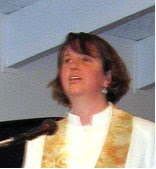Mika sun ammatti on? (What is your profession?)
Ma olen pastori.
"You make pastries?" my neighbor asked. If I was really quick in such things I would have answered, "No, I heat things up to purify them." That pretty much sums up what pastors do, doesn't it?
That was our first day of Finnish Language class on Thursday. The two hour class turns out to only be 90 minutes. In Finland a class that is posted to run from 14:00-16:00 actually starts at 2:15 and ends at 3:45. So strange.
After learning lots of useful little phrases (like how to say what country we are from and what our profession is) the teacher gave a little lecture about Finnish language. There are some things, she said, that make learning Finnish easy.
1. No articles. None of that 'der' or 'die' or 'das' like they have is German.
2. No gender. Really, no gender! For example, you want to say "My friend and I went to a movie. She didn't like it." There would be no she. The word indicating another person is han, used for male or female. Charles says Finns speaking in English have a really hard time with he/she, often using the wrong one or switching part way through the conversation. It is even more confusing for Charles because he doesn't necessarily know if Finnish names like Paivi, Nuppu, Jorma, or Jonna (names of a few Finnish people we know who's gender we actually do know) are male or female, and then the speaker will switch pronouns half way through a conversation. Kind of confusing, but also refreshing. Separate words for professions (ex, waiter, waitress) also no longer exist in Finnish. They decided decades ago that gender in such situations does not matter. The exception, our teacher said, is there are still separate words for King and Queen.
3. No future tense. Fascinating. You say "I am cooking." "I am cooking tomorrow." None of this "will be" stuff to worry about.
4. 1:1 relationship between letters and sounds. You pronounce every letter (even/especially when they are doubled). The difference between 'meet' and 'kill' in Finnish is a single 'a' versus a double 'a.' Very important to pronounce those double letters. Also, every letter only makes one sound. There are no long and short vowels, 'c' only says one thing.
5. Stress is always on the first syllable. Makes guessing at pronunciation much easier.
There are a bunch of things that make learning Finnish hard, too. Her list was shorter but, to me, they were much more daunting and too complicated to even try to explain in a blog post, mainly because I don't understand them yet. So it goes.
Subscribe to:
Post Comments (Atom)

No comments:
Post a Comment